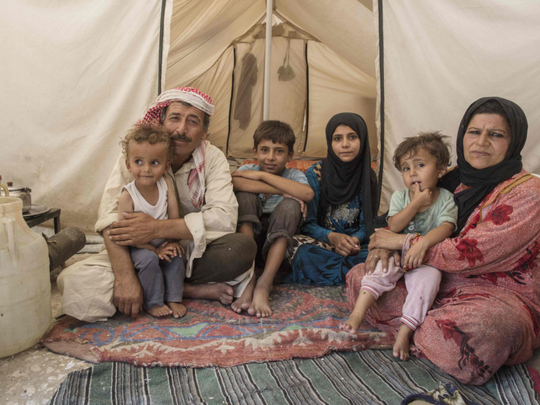
Beirut: Children escaping Syria’s Raqqa have been “tormented” by years of living under extremist rule culminating in a ferocious bombing campaign on the city, a charity said on Monday.
It could take decades for young people from Daesh’s stronghold to overcome their psychological injuries, Save the Children warned.
The nongovernment organisation (NGO) interviewed the children and families who escaped the war-torn city, where a US-backed assault is battling to defeat Daesh.
“Raqqa’s children might look normal on the outside but inside many are tormented by what they’ve seen,” said the NGO’s Syria director, Sonia Khush.
“The children of Raqqa didn’t ask for the nightmares and memories of seeing loved ones die right in front of them.”
Raashida, 13, fled with her family three months ago to a displacement camp north of Raqqa.
“IS [Daesh] beheaded people and left their bodies on the ground. We saw this and I couldn’t handle it,” she said.
“I wanted to sleep but I couldn’t when I remembered what I saw. And I wouldn’t sleep — I would stay awake because of how scared I was.”
Since the terrorist outfit overran Raqqa in early 2014, the city became synonymous with horrifying practices: public beheadings, stonings and radical propaganda in schools.
Raashida’s father, Aoun, said he tried to keep his children away from such sights, but they slowly became accustomed to the macabre scenes.
“There is nothing called ‘children’ anymore, we are all in a living hell now,” he said.
Up to 25,000 people — almost half of them children — remain trapped in Raqqa as US-backed forces tighten the noose on Daesh.
Save the Children warned that heavy coalition bombardment left families “facing an impossible decision: stay and risk being bombed or leave and risk being shot at by IS [Daesh], or stepping on a landmine”.
Yaacoub, his nine siblings, and their parents came under Daesh sniper fire as they made the perilous journey out three months ago.
The 12-year-old and his siblings described Daesh punishments such as stonings, cutting off smokers’ fingers and sewing mouths shut.
“They filled the roundabout with heads that had been cut off. We saw them doing it, and cutting off hands,” Yaacoub said.
His younger brother, two-year-old Fuad, was wounded in an air strike.
Monitors have said hundreds of civilians have been killed in coalition raids since the Arab-Kurdish alliance it backs broke into Raqqa in early June.
The United Nations has called for a pause in fighting to allow remaining civilians to flee.
Save the Children backs safe routes for children and families, but said that was just the beginning of a longer process to ensure their mental well-being, too.
“It’s crucial that the children who’ve made it out alive are provided with psychological support to help them deal with the trauma of witnessing senseless violence and brutality,” said Khush.
“We risk condemning a generation of children to a lifetime of suffering unless their mental health needs are addressed.”












